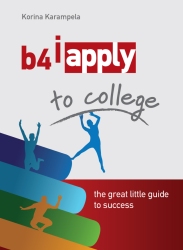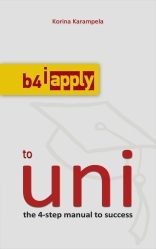Korina Karampela talks to Johnny Rich- the Managing Director of Push and leading expert on higher education and careers- about the importance of careers guidance at schools.
- There is a lot of information available online about university choices and possible career paths that prospective students can easily access. Is this enough?
In terms of information, there is plenty. We could do with more data, more information, but without helping people understand it, information is just noise. What we need is more advice and guidance.
Advice is when you put those facts into a context, such as, “The average national drop-out rate is about 17%. The students who drop-out may end up with no degree and significant debts”.
And guidance is when the advice is applied to the individual, such as listening to someone’s concerns about whether they’ll be able to stick out at university and talking to them about the broader context concerning dropping out. And this really matters.
- If you were able to make one change to improve the quality of careers guidance offered at schools, what would it be?
More funding, of course! But maybe ‘more funding’ is not a helpful answer to your question. In that case, I would say that careers guidance needs to be more about helping people make a life and not just a living.
It is miserable to think that people spend their entire working lives wishing for the two days a week and the three weeks a year when they don’t work.
With inspirational guidance – which may be little more than the right few words at the right time – a career can be about fulfilling your potential, contributing to the society, gaining reward and recognition for how you spend the every minute of your day.
Doesn’t that sound like fun? And if a rewarding career is fun, why isn’t that always reflected by careers advice and guidance?
Careers advice has a reputation for being dull, for waking people up to harsh realities. It should be the opposite: careers advice should be about raising aspirations and showing the path to achieve them. Sure, you need realistic expectations along the way, but it should not be about putting up barriers.
- What is the most common misconception that young people have about higher education?
A key misconception is that they don’t understand the diversity on offer. Every student is different and they should embrace their differences when looking for a university that suits them. University league tables are an insidious distraction that end up creating the impression that one-size-fits-all when it comes to student life, and if you haven’t made the grades in terms of their notion of ‘best’, then you are a second-class citizen.
Perhaps it’s also worth mentioning that students often have the misconception about what university can do for them. It is not a magic conveyor belt that spits you out as a fully employable graduate. Higher education is a process in which you must engage and milk it dry of all it has to offer. It’s something you do, not something that happens to you.
- What are the 3 ‘Dos’ and 3 ‘Don’ts’ young people who aspire going to university need to be aware of?
The Do’s are:
- Do choose the university and the course that suits you as an individual.
- Do your research to work out which that is. Obviously, you can check out Push, BestCourse4Me, Which? University, Bright Knowledge and loads of other great resources out there. But better than those is to visit universities for yourself.
- Do plunge yourself into what student life has to offer whether that’s the academic adventure, the CV-pumping extra curricular activities or the horizon-broadening social life.
The 3 Don’ts are:
- Don’t feel you have to go, if it’s not right for you right now.
- Don’t live anyone else’s life. It’s your choice.
- Don’t be put off by the issue of debt. Yes, it’s bad. But it’s endurable and, if you make the right choices, for most people the rewards outweigh the downsides.
The bottom line: There are many career options available out there. It comes down to good advice and guidance – and research on the part of individual. But it also comes down to living your own life.
Korina Karampela is the founder of b4iapply, author of 2 books, consultant and speaker. She has worked in senior positions in the pharmaceutical industry for 12 years and has an MBA from MIT Sloan. Her b4iapply blog is recommended by The Guardian for professional development.




